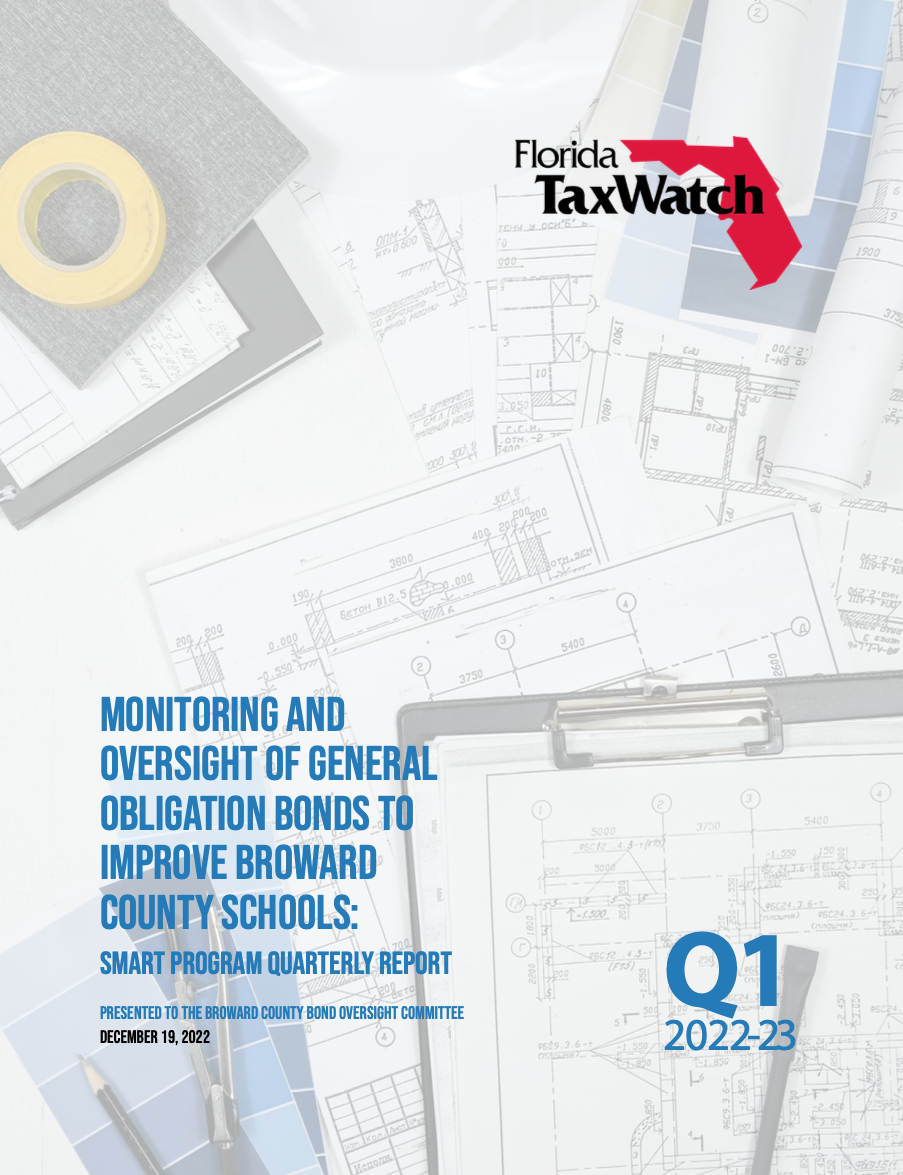Monitoring and Oversight of General Obligation Bonds to Improve Broward County Schools: SMART Program Quarterly Report

The Broward County Public Schools’ Bond Oversight Committee Quarterly Report for the Quarter that ended September 30, 2022 (“District Quarterly Report”) provides updated information on the implementation of the District’s SMART Program and the use of general obligation bond funds to purchase and install technology upgrades, purchase music, and art equipment, improve school safety and security, upgrade athletic facilities, and renovate educational facilities.
In this report, Florida TaxWatch has offered recommendations to help guide the Bond Oversight Committee in its oversight of the implementation of the SMART Program, and to ensure that public’s right-to-know how the taxpayer-approved General Obligation Bond funds are being spent is well-served. Florida TaxWatch looks forward to presenting the results of its review to the Committee and the public, and to providing continued support and guidance as the Bond Oversight Committee continues its effective oversight of SMART Program implementation.
With the release of the Final Report of the Twentieth Statewide Grand Jury and the subsequent removal and replacement of four elected SBBC members, the election of four new SBBC members, and the termination of the Superintendent’s employment, it would be an understatement to say that the District faces a considerable amount of uncertainty as it continues its implementation of the SMART Program.
The Twentieth Statewide Grand Jury’s findings notwithstanding, the District continues to make progress in implementing the SMART Program. The Technology, Music and Arts, and Athletics spend portions of the SMART Program have been completed. More than 90,000 computing devices have been purchased, bringing the ratio of students-to-computers to 2:1, better than the adopted standard of 3.5 students per computer. Numerous “back office” upgrades to the Technology Support Services Center have been implemented to support these new devices. The District has upped its investment in the Arts, with the purchase of more than 60,000 pieces of musical equipment, more than 130 kilns, and theater program upgrades at 39 schools. Athletic tracks have been resurfaced at 15 schools and 30 high schools have received new weight rooms.
As shown in Figure 5, the number of Primary Renovations projects that have been flagged for schedule delays has decreased significantly and has remained at lower numbers since the 2020 schedule reset. In addition, fewer Primary Renovation projects are at medium or high risk of additional redesign or other scope changes.
Despite this progress, the District will face several challenges going forward. The first challenge is controlling costs. Florida TaxWatch considers controlling project costs and mitigating the additional financial risk to be the greatest challenge facing the District as SMART Program implementation moves forward. When we talk about “financial risk,” we are talking about the potential for increases to the SMART Program budget and projected costs.
The SMART Program budget has increased from $987.4 million to $1.528 billion, an increase of about $541 million over the original budget. Every dollar above the $987.4 million originally allocated to the SMART Program represents a dollar of additional risk, and comes from capital millage, impact fees, state funds (e.g., Public Education Capital Outlay), and other sources, which have specific restrictions and spending limitations, or which were intended to be spent on other projects.
After increasing significantly over the past several reporting quarters, the potential financial risk has remained level during Q1 2022-23, with outcomes ranging from a low (mid-point risk) of $689 million to a high (high end risk) of $706 million, with a most likely estimate (70 percent risk) near $692 million. The District has set aside $691 million in reserve to mitigate the SMART Program’s financial risk, which will only cover the low risk scenario. The District will very likely be required to increase the amount of money placed into reserve.
The second challenge is maintaining the schedule and scopes of work. The 2020 Schedule reset projects the completion of the planned facilities construction projects late in calendar year 2025 or early in calendar year 2026, approximately three years after the planned completion milestones in the 2018 schedule. Florida TaxWatch thinks it is unrealistic to think the planned facilities construction projects will remain on schedule absent immediate actions by the SBBC to reduce the amount of time between contract award and authorization to proceed; reduce the multiple trips to the building department required before approval is received; and reduce the amount of time required to approve change orders.
The third challenge is resetting the expectations of Broward County taxpayers, who are learning that, with the adoption of the 2020 Schedule, the completion dates for many of the Primary Renovations projects at schools where they work or where their children attend school will be pushed back several years. The District has acknowledged the need to communicate the 2020 Schedule to the public and to help them understand what has happened and to reset their expectations going forward.
A final challenge is addressing the perception by the business community that the District is not a compelling place to do business. The District continues its efforts to ensure participation by Minority/Women Business Enterprises (M/WBE), ethnic-owned business enterprises (EBEs) and small business enterprises (SBEs) that provide commodities (supplies), construction, professional services, and business services to District schools. The District has dropped below its goal to award 30 percent or more of SMART Program contracts to E/S/M/WBE certified companies. Hispanic-American owned businesses are over-represented and African-American owned businesses, non-minority-owned, and Women-owned businesses are under-represented. Although effort has been made to increase attendance at and participation in pre-bid meetings by African-American owned firms, more effort will be required to address these inequities.